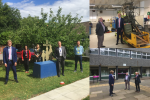
While much focus is given to the Covid crisis right now, we must not take our eye off the looming challenges that climate change will pose. So as we come to the end of the year I wanted to take a look back at COP-26 and the huge step taken forward with its agreements from global leaders and their negotiating teams.
COP-26 was the United Nations Climate Change Conference for 2021, hosted by the UK in Glasgow, with the UK as President of the conference. COP stands for ‘Conference of the Parties’ and COPs are the most important international events to negotiate and tackle climate change. Over the course of two weeks intense negotiations take place between countries, and this year the ‘Glasgow Pact’ was agreed, the most substantial update on international pledges to tackle climate change since the 2015 ‘Paris agreement’ at COP-21.
A range agreements were reached on a variety of issues, from deforestation to finance, and you can read about this in more detail here - https://ukcop26.org/wp-content/uploads/2021/11/COP26-Negotiations-Explained.pdf - but I’d like to draw to your attention to what I see as three particularly important parts:
-
An increased commitment to reduce emissions to keep restricting temperature rises to 1.5 degrees in sight.
-
A commitment to reduce use of coal (not quite as strong as cut out completely but a big step forward nevertheless).
-
Agreement of the ‘Paris Rulebook’ – this is the framework of how the Paris Agreement will be implemented and countries held to account on their emissions (although very technical this is absolutely critical if these agreements will actually mean anything).
Each day of the COP-26 negotiations had a certain theme, and I attended COP-26 on both the Science and Gender and Sustainable Transport days to support my work campaigning on these issues both locally and nationally. Alongside the negotiations, COP-26 hosted a range of ‘fringe events’ set in the ‘Blue Zone’ which was for the diplomatic teams, and the ‘Green Zone’ open to the public and held in the Glasgow Science Centre.
Sustainable Transport
This is one of the key sectors that we need to decarbonise, and on which we feel the most direct impact locally. We benefit from investment and jobs linked to the motorways running through the constituency and our proximity to Heathrow airport. But these come with a cost, both in terms of noise and air pollution through use of petrol, diesel, and aviation fuel.
At present the two options we have for decarbonising road vehicles are to either use electricity (batteries) and hydrogen as power sources. Battery technology isn’t there yet to give the range that we need, but hydrogen power does offer this. The problem is that at the moment hydrogen is very expensive as we do not have the infrastructure needed to extract it from water using renewable power or nuclear (green hydrogen). You can also get ‘blue’ hydrogen from extracting it from natural gas and ‘brown’ hydrogen from coal but both of these give off carbon which defeats the point. This is an area where the Government can step in and support the risky business ventures and start-ups to develop our domestic hydrogen production infrastructure and I’d like to see Runnymede and Weybridge and Surrey take the lead here. Minister Lee Rowley spoke about the work we can do globally to support innovation and make the UK a global leader.
I also attended the panel focused on how HGVs can decarbonise and the innovative work being done in the sector to introduce electric HGVs and the importance of hydrogen infrastructure.
Outside the green zone seeing new electric cars the challenges of this technology are all too evident. While a ‘premium’ model, the price tag of £50,000 makes it wholly unaffordable for almost every family, and here in lies the mission. Only through expansion and development of these technologies, and through mass production, can the costs be brought down to being affordable. If people are to transition to using carbon neutral technology, it must be financially viable, and if anything, cheaper than using current methods. Therefore Government has another important role to play in supporting businesses to invest and transition in these areas, through tax breaks and other commercial incentives, but ultimately the solutions must come from business and the market. It needs to be cheaper, easier, and better to go green!
Aviation poses more challenges to decarbonise than cars and trucks. Electric planes are now being trialed, but it is difficult to see how we can transition away from using the jet engine. At the moment jet engines burn kerosene extracted from crude oil, but work has been done by Rolls Royce (who I also spoke to at COP-26) to develop engines that burn ‘Sustainable Aviation Fuel’ or SAF. SAF is made from ‘grown’ products such as cooking oil, animal feed, paper, wood, textiles. So, plants and trees that have grown and absorbed carbon are burnt as fuel, but as they absorbed the carbon from the air while growing, the net effect is zero. Already some domestic flights are using 10% SAF, as I learnt from John Holland-Kaye CEO of Heathrow who I met at COP-26 alongside Emma Gilthorpe who is the CEO of the Jet-Zero council and discussed supporting local jobs in aviation and meeting the challenges of sustainability. The Government is leading the way in this area, and I attended the ‘SAF toolkit launch’ – a guidebook on how to set up domestic SAF infrastructure for all nations, and spoke to aviation minister Rob Courts MP about the work we are doing in setting out how to globally transition to using SAF.
I also attended the launch of the Jet COP-26 Declaration: International Aviation Climate Ambition Coalition – prior to the event Grant Shapps Secretary of State for Transport said, ‘From our roads to the skies, the transition to zero emission transport has reached a tipping point. We know that transport plays a key role saving the planet from warming above 1.5 degree C, which is why this is the COP that will kick start our ambition for zero emission aviation and why I'm proud to be uniting world leaders to tackle climate change-creating new opportunities for clean growth, green jobs, and improved air quality right across the globe.’. This is crucial if sustainable aviation is going to ‘take off’ as planes using SAF will need to refuel abroad, and there will be a need as with all things in aviation, to be joint agreements and common standards on how this operates.
Aviation is so critical to many people living and working in Runnymede and Weybridge. Given our proximity to Heathrow and Gatwick, not only do we have many people working directly in aviation, from flying planes through to operating the airport, we also have many businesses that set up locally working in logistics or simply because of the connectivity Heathrow offers. Aviation and international travel in general has been battered during the pandemic, and as it recovers, it faces even greater challenges going forward with the transition to sustainability. As I said in my video message on the way to COP-26 – planes are not the problem, dirty planes are, and we urgently need to lead the way to transition to sustainable aviation for not just our planet but for employment and prosperity locally. But I also believe this offers us opportunities and I am exploring how we could lead the way in making or supporting fuel infrastructure locally both SAF and hydrogen.

The key to tackling climate change - Science, Skills and future workforce
All our solutions for climate change depend on new technologies being developed, improved on and rolled out across the world. From using green hydrogen or SAF, the new vehicles and charging points, to the heat pumps for people’s home. All will need a plentiful supply of energy which is carbon neutral and will need people to build, maintain and install them.
Prior to COP-26 I believed that we needed to support expansion of our STEM workforce, and improve access into STEM training and careers, especially for women and people from marginalised backgrounds. Now I see that this is critical for our future prosperity. As the world comes together to tackle climate change, with the solutions being science and technology, people with these skills over the next 10-20 years are going to be in great demand.
Just as the industrial revolution started off in the UK, I believe that we can also lead the next ‘Green Industrial Revolution’ and by investing now as we are doing in research and infrastructure, we can both lead the world in decarbonising and prosper economically from it creating many jobs both locally and nationally. Government has a key role to play here in supporting start-ups and what are at present risky business ventures, through to the establishment of hydrogen and SAF supply chains. But without the people, we have a problem. I’m keen that Runnymede and Weybridge is centre to this, and I believe that we need closer work and support between employers in STEM sectors and schools, and a ‘schools science’ strategy to bolster our workforce. Watch this space…

